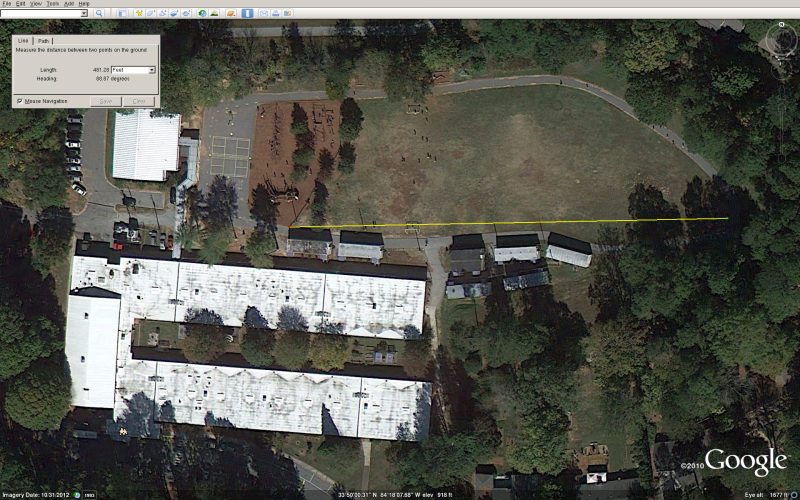Solar System scale activity: Difference between revisions
(Mercury size cleanup) |
(Table of scaled solar system values) |
||
| Line 4: | Line 4: | ||
I'm using an [https://www.exploratorium.edu/ronh/solar_system/ online solar system scale calculator] to see what our solar system model can look like. Although the video serves science education by using metric units, I wonder if we should use US customary units instead? Using the scale chosen in the video, 1,264,000,000:1 (calculated from the video's stated 110 cm (4.3 inch) grapefruit = 1.39 million kilometer sun)!, we can comfortably get out to Saturn at 370′. A 5.5′ sun gets us Saturn at 470′ (the length of our field) and a scale of 1,600,200,000:1 , but I think I'll stick with their scale because they give us good size references (e.g. Mercury is only the width of just 4 human hairs). |
I'm using an [https://www.exploratorium.edu/ronh/solar_system/ online solar system scale calculator] to see what our solar system model can look like. Although the video serves science education by using metric units, I wonder if we should use US customary units instead? Using the scale chosen in the video, 1,264,000,000:1 (calculated from the video's stated 110 cm (4.3 inch) grapefruit = 1.39 million kilometer sun)!, we can comfortably get out to Saturn at 370′. A 5.5′ sun gets us Saturn at 470′ (the length of our field) and a scale of 1,600,200,000:1 , but I think I'll stick with their scale because they give us good size references (e.g. Mercury is only the width of just 4 human hairs). |
||
{| class="wikitable" |
|||
|+ Solar System at 1/1,264,000,000 Scale |
|||
! What !! Diameter !! Orbit Radius (feet) |
|||
|- |
|||
| Sun || Grapefruit (4.3″) |
|||
|- |
|||
| Mercury || 4 hair widths (0.0151″) || 15 |
|||
|- |
|||
| Venus || 10 sheets of paper thick (0.0376″) || 28 |
|||
|- |
|||
| Earth || 1 millimeter (0.0396″) || 39 |
|||
|- |
|||
| Mars || ½ the size of Earth (½mm) (0.021″) || 59 |
|||
|- |
|||
| Jupiter || Almost half-inch (0.4448″) || 202 |
|||
|- |
|||
| Saturn || Hieght of Lego brick (0.3622″) || 370 |
|||
|- |
|||
| Uranus || 0.146″ || 744 |
|||
|- |
|||
| Neptune || 0.1413″ || 1,167 |
|||
|- |
|||
| Voyager spacecraft <br>(farthest man-made object) || || 4,590 (0.87 miles) |
|||
|- |
|||
| Betelgeuse <br>(Red giant star) || 135′ || |
|||
|- |
|||
| Sirius B <br>(White dwarf star) || 0.0433″ || |
|||
|} |
|||
{| class="wikitable" |
|||
! What !! Distance from Sun (miles) |
|||
|- |
|||
| Alpha Centauri <br>(Nearest star) || 2,000 |
|||
|- |
|||
| Galactic center <br>(Center of Milky Way) || 12,873,222 |
|||
|} |
|||
{| class="wikitable" |
|||
! What !! Quantity |
|||
|- |
|||
| Light Speed || 1 inch per second |
|||
|- |
|||
| Light Year || 465 miles |
|||
|} |
|||
Revision as of 21:14, 26 April 2014
In 2014-05, I was asked by Sagamore second grade teacher Ms. Quinn to help do something for the first grade and kindergarteners on Sagamore Space Day. I'd like to do what I proposed back in January, of imagining the real scale of the solor system, riffing off of, "How Big is the Solar System? | It's Okay to be Smart | PBS Digital Studios - YouTube".

I'm using an online solar system scale calculator to see what our solar system model can look like. Although the video serves science education by using metric units, I wonder if we should use US customary units instead? Using the scale chosen in the video, 1,264,000,000:1 (calculated from the video's stated 110 cm (4.3 inch) grapefruit = 1.39 million kilometer sun)!, we can comfortably get out to Saturn at 370′. A 5.5′ sun gets us Saturn at 470′ (the length of our field) and a scale of 1,600,200,000:1 , but I think I'll stick with their scale because they give us good size references (e.g. Mercury is only the width of just 4 human hairs).
| What | Diameter | Orbit Radius (feet) |
|---|---|---|
| Sun | Grapefruit (4.3″) | |
| Mercury | 4 hair widths (0.0151″) | 15 |
| Venus | 10 sheets of paper thick (0.0376″) | 28 |
| Earth | 1 millimeter (0.0396″) | 39 |
| Mars | ½ the size of Earth (½mm) (0.021″) | 59 |
| Jupiter | Almost half-inch (0.4448″) | 202 |
| Saturn | Hieght of Lego brick (0.3622″) | 370 |
| Uranus | 0.146″ | 744 |
| Neptune | 0.1413″ | 1,167 |
| Voyager spacecraft (farthest man-made object) |
4,590 (0.87 miles) | |
| Betelgeuse (Red giant star) |
135′ | |
| Sirius B (White dwarf star) |
0.0433″ |
| What | Distance from Sun (miles) |
|---|---|
| Alpha Centauri (Nearest star) |
2,000 |
| Galactic center (Center of Milky Way) |
12,873,222 |
| What | Quantity |
|---|---|
| Light Speed | 1 inch per second |
| Light Year | 465 miles |